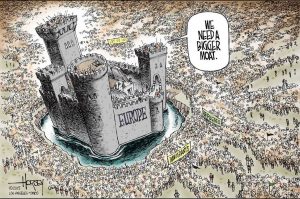Europe: if we do not step up together, the situation will only get worse
 Romano Prodi: EU confronted by existential crisis
Romano Prodi: EU confronted by existential crisis
Former Commission President Romano Prodi says the European Union is “confronted with an existential crisis” with “unhappiness among populations and distrust of politicians.”
Article by Martin Banks on The Parliament Magazine of 8 March 2019
Prodi, who was speaking in Brussels, cited the “spectre of de-globalisation” and a trade war between the United States and China as just two of the key challenges for 2019 and beyond.
Other tests for the EU, he said, include the “uncertainty created by Brexit” along with Hungary, Poland and Romania “backsliding on the rule of law.”
With the European elections in May, the “continued rise of populism” was another challenge for the EU, he said.
Prodi, who served as the tenth president of the European Commission from 1999 to 2004 and was also twice Prime Minister of Italy, was presenting a new report that calls for a “social Europe.”
He said the current challenges facing the EU “are at the heart our report.”
“Our social models,” he argued, “are under pressure – with a huge and as yet unsatisfied requirement to modernise and adapt to the needs of all our citizens, and the opportunities presented by a digitally-transformed world.”
“The aftermath of the Eurocrisis has caught Member States in dire fiscal straits, a choice between two competing evils – between Scylla and Charybdis. Pressures for deficit reduction constrain the domestic policy space for social investment reform, while populists – increasingly successful with disenchanted citizens – resist austerity measures.
“Look at the recent standoff between the Commission and Italy’s Government over its fiscal stimulus commitment and the gilets jaunes backlash against President Macron’s reform momentum in France.”
Prodi, considered the founder of the Italian centre left, said, “There is a clear and urgent need for us to be brave and ambitious for a genuine social Europe and I commend this Commission for its efforts in this direction. The Juncker Commission has taken on an ambitious swath of social policy initiatives.”
The study, by the High-Level Task Force on investing in Social Infrastructure in Europe, was co-chaired by Prodi and Christian Sautter, a former French Minister of the Economy, Finance and Industry.
Calling for much more social infrastructure investment, the report says that public investment in social infrastructure during the Eurocrisis reached a 20-year low.
This, it says, was most acutely felt in three sectors that are “absolutely critical for the wellbeing of Europe’s citizens, now and in the future: health, education and housing.”
Prodi said that current investment in social infrastructure in the EU is estimated at €170bn per year but the minimum infrastructure investment gap in the three priority sectors is estimated at €100bn to €150bn, representing a total gap of at least €1.5tr between 2018 and 2030.
He said, “Social infrastructure is critical to our future because it shapes the nature of our society and makes social services and investments in human capital possible.”
He went on, “High-quality large-scale investments in social infrastructure are especially required in the EU now given our ageing populations, radical structural changes in labour markets and the opportunities presented via technological innovation.”
He says an ageing population will have a “serious and prolonged” impact, particularly on the affordability of health and on long-term care and pensions.
This is in addition to substantial investments needed in education and competence development, argued Prodi.
On housing, he said, “While demand for affordable energy-efficient and accessible housing continues to grow, incomes grow less than the cost of housing and energy.”
“We know that the cost of energy and rent of basic housing is increasing far faster than salaries of citizens. This creates a vicious circle in which many people pay near to 40 percent of their income for housing, paying unaffordable prices to keep their homes warm or cool, while increasing numbers of people wait and wait on never-ending waiting lists for social housing. Others depend on subsidies to pay for their heating and risk becoming homeless.”
The numbers are “staggering,” said Prodi, who, during his visit to Brussels had a meeting with commission president Jean-Claude Juncker and gave a briefing to reporters.
“Many older or disabled people have to leave their homes prematurely and are on waiting lists to enter special institutions. If their homes and social services could only be adapted and updated, they could stay in their own communities – with all the benefits that brings.”
He said the Commission, EIB and banks have already made major efforts but warned, “If we do not step up, together, now, in the pace and level of ambition then the situation will only get worse – with serious and costly human and political consequences.”
He urged the Commission to “use all the instruments and resources still available to step up our collective level of ambition.”
Turning to the upcoming elections to the European Parliament Prodi said, “Only then can we make real, meaningful progress to help our citizens with the greatest need and make these efforts visible to all in advance of the upcoming elections.”






















